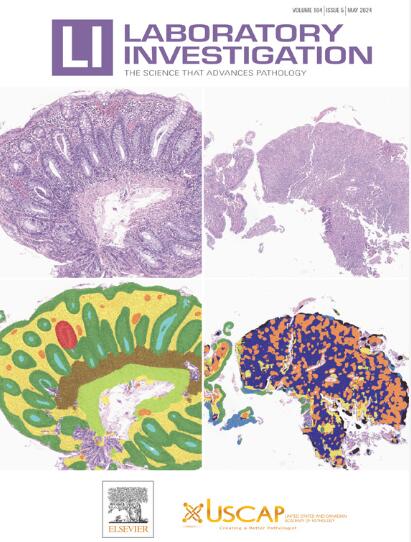Downregulation of MHC-I on Melanoma Cells and Decreased CD8+ T-Cell Infiltration Are Associated With Metastatic Spread and Resistance to Immunotherapy
IF 5.1
2区 医学
Q1 MEDICINE, RESEARCH & EXPERIMENTAL
引用次数: 0
Abstract
The success of immune checkpoint inhibitors (ICI) in melanoma therapy has catalyzed the introduction of ICI in increasingly early stages of the disease. This exposes many patients with a lower risk of relapse to the risk of protracted adverse events, highlighting the need for biomarkers guiding the use of ICI. Already many years ago, brisk infiltration of primary melanomas by lymphocytes has been linked to improved patient outcome, but controversial findings due to a high variability in classification systems have been described CD8+ T cells have been identified as a primary mediator of antitumor immunity in patients treated with ICI. As CD8+ T cells require the presentation of antigens via MHC-I on target cells, downregulation and loss of MHC-I have been observed as resistance mechanisms to ICI. In this study, we revisit the role of MHC-I expression and CD8+ T-cell infiltration in melanoma evolution using a cohort of advanced primary and matched metastatic melanomas by using an automated immunohistochemistry and digital pathology workflow. Our results show that downregulation of MHC-I expression is a frequent event in advanced primary melanomas that is associated with decreased CD8+ T-cell infiltration and an early metastatic spread to sentinel lymph nodes. Furthermore, MHC-I downregulation and decreased infiltration with CD8+ T cells are also associated with resistance to ICI. Our results suggest that analyses of MHC-I expression and CD8+ T-cell infiltration patterns could serve as future biomarkers to guide the decision to treat patients in early stages of melanoma with ICI.
黑色素瘤细胞上 MHC-I 的下调和 CD8+ T 细胞浸润的减少与转移扩散和免疫疗法的抗药性有关。
免疫检查点抑制剂(ICI)在黑色素瘤治疗中取得的成功促使越来越多的早期患者开始接受 ICI 治疗。这使得许多复发风险较低的患者面临长期不良反应的风险,从而突出了对指导使用 ICI 的生物标志物的需求。早在多年前,原发性黑色素瘤的淋巴细胞快速浸润就被认为与患者预后的改善有关,但由于分类系统差异较大,研究结果存在争议。在接受 ICI 治疗的患者中,CD8+ T 细胞已被确定为抗肿瘤免疫的主要介质。由于 CD8+ T 细胞需要通过靶细胞上的 MHC-I 呈递抗原,因此已观察到 MHC-I 的下调和缺失是 ICI 的抵抗机制。在这里,我们使用自动免疫组化和数字病理学工作流程,通过一组晚期原发性和匹配的转移性黑色素瘤,重新审视了 MHC-I 表达和 CD8+ T 细胞浸润在黑色素瘤演变中的作用。我们的研究结果表明,MHC-I表达下调是晚期原发性黑色素瘤的常见现象,它与CD8+ T细胞浸润减少和向前哨淋巴结的早期转移扩散有关。此外,MHC-I 下调和 CD8+ T 细胞浸润减少还与对 ICI 的耐药性有关。我们的研究结果表明,对MHC-I表达和CD8+ T细胞浸润模式的分析可作为未来的生物标志物,指导对黑色素瘤早期患者进行ICI治疗的决策。
本文章由计算机程序翻译,如有差异,请以英文原文为准。
求助全文
约1分钟内获得全文
求助全文
来源期刊

Laboratory Investigation
医学-病理学
CiteScore
8.30
自引率
0.00%
发文量
125
审稿时长
2 months
期刊介绍:
Laboratory Investigation is an international journal owned by the United States and Canadian Academy of Pathology. Laboratory Investigation offers prompt publication of high-quality original research in all biomedical disciplines relating to the understanding of human disease and the application of new methods to the diagnosis of disease. Both human and experimental studies are welcome.
 求助内容:
求助内容: 应助结果提醒方式:
应助结果提醒方式:


